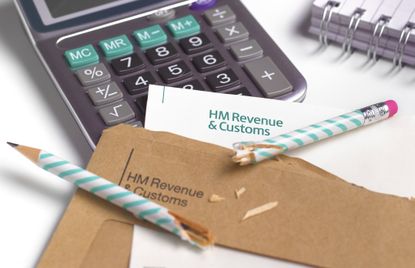Mini-budget 2022: What the cut to the basic rate of income tax means for your pay
The basic rate of income tax is to be cut from 20% to 19%. We explain what it means for your pay


Millions of workers will see extra money in their pay now income tax and National Insurance contributions are being cut.
Chancellor Kwasi Kwarteng announced in the mini-Budget that the basic rate of income tax will fall by one percentage point from 20% to 19% from April 2023. He previously abolished the top rate of tax - the 45% rate for earnings over £150,000 - but this decision has since been reversed after an outcry by the public and Tory politicians.
It comes alongside a reversal of the 1.25% point hike to National Insurance from 6 November this year. Kwarteng also axed the Health and Social Care Levy, a separate tax to fund social care that was included within household National Insurance contributions and due to come into force in April 2023.
Kwarteng emphasised in his mini-Budget on 23 September: “It is an important principle that people should keep more of the money they earn.”
It marks a complete reversal of the former Conservative government’s policy: the rise to National Insurance and introduction of the levy were announced by former chancellor Rishi Sunak, but new Prime Minister Liz Truss promised to change it during the Conservative leadership race.
We explain what these key changes to your income tax will mean for your pay.
Cut in basic rate of income tax
The basic rate of income tax will be cut 1p to 19p from April 2023.
Look After My Bills Newsletter
Get the best money-saving tips, tricks and deals sent straight to your inbox every week. Make sense of your money in partnership with The Money Edit.
It means anyone earning up to £50,270 will now pay 19% income tax rather than 20%. This is happening a year earlier than the government had previously promised.
From April a worker on £20,000 will save £74 a year, someone on £30,000 will save £174 a year and those on £40,000, £274 a year, according to personal finance experts interactive investor.
Workers earning £60,000 a year will save £377 a year.
But, if you earn less than £12,570 a year, you won't benefit from the changes because you don't pay any tax under this amount - this is known as your tax-free personal allowance
These savings figures don’t include the changes to National Insurance.
U-turn on scrapping the 45% top rate of income tax
The 45p tax rate for high earners over £150,00 was set to be abolished from April 2023 and replaced with a 40p rate. This change would have affected around 1.9% of the UK’s highest earners. A worker on £200,000, for example, was set to save £2,877 a year.
However, after a fall in the pound and a backlash from Tory MPs, Chancellor Kwasi Kwarteng reversed his decision.
It means anyone earning more than £150,000 will see their income tax remain at 45% rather than drop to 40%.
What are the new tax bands?
| Band | Taxable income | Tax rate now | New tax rate from April 2023 |
|---|---|---|---|
| Personal allowance | Up to £12,570 | 0% | 0% |
| Basic rate | £12,571 to £50,270 | 20% | 19% |
| Higher rate | £50,271 to £150,000 | 40% | 40% |
| Additional rate | over £150,000 | 45% | 45% |
Remember you pay the rate of tax for what you earn within each band. For example you don’t pay any tax on the first £12,570 you earn, and then you will pay 19% on what you earn between £12,571 and £50,270.
What do Tax and NI cuts mean for your salary?
You can use the table below to see how much you stand to save in tax and National insurance payments from next April.
| Salary | Tax savings | NI Savings | Total savings |
|---|---|---|---|
| £10,000.00 | £0.00 | £0.00 | £0.00 |
| £15,000.00 | £24.30 | £30.38 | £54.68 |
| £20,000.00 | £74.30 | £92.88 | £167.18 |
| £25,000.00 | £124.30 | £155.38 | £279.68 |
| £30,000.00 | £174.30 | £217.88 | £392.18 |
| £35,000.00 | £224.30 | £280.38 | £504.68 |
| £40,000.00 | £274.30 | £342.88 | £617.18 |
| £45,000.00 | £324.30 | £405.38 | £729.68 |
| £50,000.00 | £374.30 | £467.88 | £842.18 |
Source: Hargreaves Lansdown
Want to know more? Stamp duty is being scrapped for property values up to £250,000, while first-time buyers will be exempt up to £425,000. Meanwhile, beer, wine and cider duty rises are being cancelled while overseas visitors will be able to shop VAT-free - find out what else the mini budget had in store in our round up.
Katie is staff writer at The Money Edit. She was the former staff writer at The Times and The Sunday Times. Her experience includes writing about personal finance, culture, travel and interviews celebrities. Her investigative work on financial abuse resulted in a number of mortgage prisoners being set free - and a nomination for the Best Personal Finance Story of the Year in the Headlinemoney awards 2021.
-
 Three energy firms pay £8m in switching compensation - has your provider paid out?
Three energy firms pay £8m in switching compensation - has your provider paid out?More than 100,000 customers have received compensation after changing providers, but is now a good time to switch energy suppliers?
By Tom Higgins Published
-
 Save £300 on your supermarket shop with cashback accounts
Save £300 on your supermarket shop with cashback accountsBanks, credit card companies and cashback sites are all offering cashback on your supermarket shop, but can you use them all to max out your savings?
By Vaishali Varu Published
-
 Save on petrol: how to save 5p off a litre of fuel at Morrisons
Save on petrol: how to save 5p off a litre of fuel at MorrisonsPetrol prices may have been falling since last summer but every penny counts at the pump. Here’s how to save 5p a litre at Morrisons for a limited time
By Sue Hayward Published
-
 Morrisons relaunches discount scheme with cheaper prices for loyal shoppers
Morrisons relaunches discount scheme with cheaper prices for loyal shoppersMorrisons is the latest supermarket to revamp prices and offers for its loyalty scheme members
By John Fitzsimons Published
-
 Coronation freebies and discounts: what’s up for grabs
Coronation freebies and discounts: what’s up for grabsFrom free railcards and holiday giveaways to discounts off food, we highlight the special offers launched to mark the coronation of King Charles III
By Ruth Emery Last updated
-
 8 ways to get interest-free money if you’re struggling
8 ways to get interest-free money if you’re strugglingHere are 8 clever ways to get interest-free income if you’re struggling with the rising cost of living
By Vaishali Varu Last updated
-
 Best birthday freebies and discounts
Best birthday freebies and discountsEnjoy your special day with these birthday discounts and freebies - we highlight 22 of the best offers
By Vaishali Varu Published
-
 Festival ticket scam warnings – how to protect yourself
Festival ticket scam warnings – how to protect yourselfConcert ticket scams have rocketed by more than 500% over the past year, while festival fraud has more than doubled. Here’s how to keep yourself safe ahead of the festival season.
By Tom Higgins Published
-
 Co-op Member Prices: Supermarket unveils discount scheme for loyal shoppers
Co-op Member Prices: Supermarket unveils discount scheme for loyal shoppersNew Co-op scheme means reduced prices for shoppers who join the co-operative. How much does it cost to join, and how does it compare to similar schemes run by Sainsbury’s and Tesco?
By John Fitzsimons Published
-
 Emergency alert test: what to expect and how to avoid being scammed
Emergency alert test: what to expect and how to avoid being scammedWe tell you everything you need to know about the UK’s first emergency alert test, which takes place this Sunday
By Vaishali Varu Published